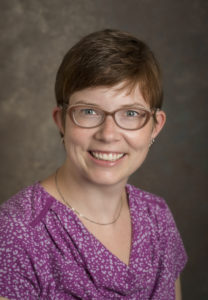This post was written by NCTE and CCCC member Stephanie Kershbaum, recipient of the 2019 Recipient of the NCTE Leadership Award for People with Disabilities.
I began attending the CCCC Convention in 2002, and within a few years was connected to disability studies scholarship happening within the field. This connection was not motivated by the focus of my research and scholarly activity, however, but by the accessibility moves that disability rhetoric presenters typically incorporated into their talks. As I wrote in a review of several disability-related panels from the 2004 Convention,
For me, as a deaf academic (and for many others attending, for many diverse reasons) conferences, particularly large ones such as CCCC, are infused with the question of access.
How well am I able to access the spoken presentations? How well do I advocate for myself and my rights to make requests of presenters and audience members (e.g., to bring hard copies of presentations that I can read; to speak slowly and clearly, to stand up when asking a question, to repeat questions at the beginning of answers)? And perhaps because of my conscious need to fight for access in many situations, I am deeply committed to issues of access—generally, and in a variety of ways—to higher education. (https://wac.colostate.edu/atd/reviews/cccc2004/index.cfm?messageid=39 )
My experience of smoother access to disability-related panels taught me a lot about what it could mean to create spaces that facilitate persistence and presence for the broadest possible range of conference attendees, and it opened the door to enduring collaborations and coalitions among NCTE/CCCC members around questions of access and inclusion.
Such questions are, of course, not only about physical and material environments such as elevators;wheelchair and mobility seating; printed copies of talk scripts, attention to lighting; signage; possibilities for remote participation’ (collective) image descriptions; distance between buildings, hotels, and session rooms; digital accessibility for the conference program and app;, but also about social environments, cultural awareness and competence, language diversity, financial resources, the affirmation and recognition of cultural and social identities, and more—all of these things interrelate to create possibilities for participation and for persistence.
When NCTE/CCCC attendees devote significant amounts of their own energy stores, take on affective and emotional labor, and have to fight to create conditions of participation, then their access and involvement with the organization is constrained in ways that are not experienced by all attendees equally.
This is one of the reasons I am delighted that NCTE has created the brand-new Leadership Award for People with Disabilities, and why I am deeply honored to be the 2019 recipient of this award. Many awards focused on disability emphasize success as a kind of overcoming, framing disability as an individual problem that people can address or solve through extraordinary effort. This one, in contrast, turns to the question of how people are doing the hard work of institutional transformation, of enacting change and creating new practices.
There is no way that I deserve credit for the changes that I’ve seen in CCCC since first attending in 2002, so I want to also acknowledge the many exceptionally talented CCCC members who have done and are doing this work, particularly those who have chaired, co-chaired, served on, and attended Committee on Disability Issues meetings, visited or helped host the robust Access Table now featured near registration at just about every Convention, compiled disability and access resources to share with conference attendees and our professional organizations, brought those resources back to our departments, and otherwise made disability an important topic of conversation at the Convention.
This is not to suggest that access issues at CCCC are resolved, or that this award obviates the need for significant additional labor, energy, and transformative change. At the 2019 CCCC Convention in Pittsburgh, for instance, a large sign proclaiming “CCCC is Accessible!” was gently—but pointedly—corrected by disability advocates writing on sticky notes numerous instances of inaccessibility that occurred across the 2019 Convention and affixing them to the sign. This image—showing that sign with multicolored post-it notes surrounding the sign’s text (photo by Ruth Osorio, available at http://www.ruthosorio.com/accessibility-at-4c19/)—illustrates how much work there is yet to do, work that many of us will continue in order to ensure that we can be in the room, participate, and engage in processes of knowledge production as well as institutional change.

Stephanie L. Kerschbaum is a associate professor of English at the University of Delaware. Her book Toward a New Rhetoric of Difference won the 2015 Advancement of Knowledge Award from the Conference on College Composition and Communication, and she has authored or co-authored more than twenty essays, articles, and book chapters. She served as chair of the Committee on Disability Issues in College Composition from 2015-18 and was elected as a member of the CCCC Executive Committee from 2016-19. During 2019-20 she is scholar-in-residence at the National Center for Institutional Diversity at the University of Michigan.

![A quote from Stephanie Kerschbaum, 2019 Recipient of the NCTE Leadership Award for People with Disabilities: Many awards focused on disability emphasize success as a kind of overcoming, framing disability as an individual problem that people can address or solve through extraordinary effort. [The Leadership Award for People with Disabilities], in contrast, turns to the question of how people are doing the hard work of institutional transformation, of enacting change and creating new practices.](/wp-content/uploads/2020/02/Kerschbaum-Stephanie-blog-feature-image-1.jpg)